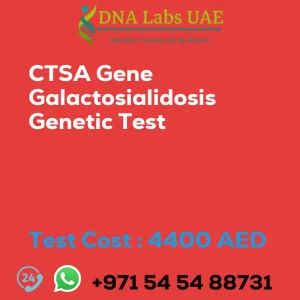SLC2A5 Gene Fructose Uptake Deficiency Genetic Test
Welcome to DNA Labs UAE, a leading genetic lab offering the SLC2A5 gene fructose uptake deficiency genetic test. In this blog post, we will provide detailed information about this genetic disorder, the genetic test components, the cost, symptoms, diagnosis, and more.
Test Name: SLC2A5 Gene Fructose Uptake Deficiency Genetic Test
Components:
- Price: 4400.0 AED
- Sample Condition: Blood or Extracted DNA or One drop Blood on FTA Card
- Report Delivery: 3 to 4 Weeks
- Method: NGS Technology
- Test Type: Metabolic Disorders
- Doctor: General Physician
- Test Department: Genetics
Pre Test Information
Before undergoing the SLC2A5 gene fructose uptake deficiency genetic test, it is important to provide the clinical history of the patient. Additionally, a genetic counseling session may be conducted to draw a pedigree chart of family members affected by fructose uptake deficiency related to the SLC2A5 gene.
Test Details
SLC2A5 gene fructose uptake deficiency is a genetic disorder that affects the ability of cells to transport and utilize fructose, a type of sugar found in many fruits and sweetened foods. This deficiency is caused by mutations in the SLC2A5 gene, which encodes a protein called GLUT5 responsible for transporting fructose into cells.
Individuals with SLC2A5 gene fructose uptake deficiency may experience symptoms such as gastrointestinal discomfort, bloating, diarrhea, and failure to thrive, especially when consuming foods or beverages high in fructose.
This condition is typically diagnosed through genetic testing, specifically Next-Generation Sequencing (NGS) genetic testing. NGS genetic testing allows for the simultaneous sequencing of multiple genes, including the SLC2A5 gene, in a high-throughput and cost-effective manner.
NGS genetic testing for SLC2A5 gene fructose uptake deficiency can be performed using a sample of DNA, typically obtained through a blood sample or saliva. The DNA is sequenced, and the resulting data is analyzed to identify any mutations or variations in the SLC2A5 gene.
This information can help healthcare professionals understand the underlying genetic cause of fructose uptake deficiency and guide treatment decisions. It provides a comprehensive analysis of the genetic makeup of an individual, allowing for accurate diagnosis and personalized treatment plans.
Benefits of Genetic Testing
Genetic testing for SLC2A5 gene fructose uptake deficiency can be beneficial for individuals experiencing symptoms related to fructose intolerance. It provides a definitive diagnosis and helps guide dietary management and treatment strategies.
Additionally, genetic testing can be useful for family members of affected individuals as it can identify carriers of the genetic mutation and inform reproductive planning.
Consult a Healthcare Professional
It is important to consult with a healthcare professional or genetic counselor before undergoing genetic testing. They can provide guidance on the appropriateness of testing, the potential risks and benefits, and the implications of the results.
Thank you for reading our blog post about the SLC2A5 gene fructose uptake deficiency genetic test. For more information or to schedule a test, please contact DNA Labs UAE.
| Test Name | SLC2A5 Gene Fructose uptake deficiency SLC2A5 related Genetic Test |
|---|---|
| Components | |
| Price | 4400.0 AED |
| Sample Condition | Blood or Extracted DNA or One drop Blood on FTA Card |
| Report Delivery | 3 to 4 Weeks |
| Method | NGS Technology |
| Test type | Metabolic Disorders |
| Doctor | General Physician |
| Test Department: | Genetics |
| Pre Test Information | Clinical History of Patient who is going for SLC2A5 Gene Fructose uptake deficiency, SLC2A5 related NGS Genetic DNA Test A Genetic Counselling session to draw a pedigree chart of family members affected with Fructose uptake deficiency, SLC2A5 related |
| Test Details |
SLC2A5 gene fructose uptake deficiency is a genetic disorder that affects the ability of cells to transport and utilize fructose, a type of sugar found in many fruits and sweetened foods. This deficiency is caused by mutations in the SLC2A5 gene, which encodes a protein called GLUT5 that is responsible for transporting fructose into cells. Individuals with SLC2A5 gene fructose uptake deficiency may experience symptoms such as gastrointestinal discomfort, bloating, diarrhea, and failure to thrive, especially when consuming foods or beverages high in fructose. This condition is typically diagnosed through genetic testing, specifically Next-Generation Sequencing (NGS) genetic testing. NGS genetic testing is a method that allows for the simultaneous sequencing of multiple genes, including the SLC2A5 gene, in a high-throughput and cost-effective manner. This type of testing can identify specific mutations or variations in the SLC2A5 gene that are associated with fructose uptake deficiency. It provides a comprehensive analysis of the genetic makeup of an individual, allowing for accurate diagnosis and personalized treatment plans. NGS genetic testing for SLC2A5 gene fructose uptake deficiency can be performed using a sample of DNA, typically obtained through a blood sample or saliva. The DNA is sequenced, and the resulting data is analyzed to identify any mutations or variations in the SLC2A5 gene. This information can help healthcare professionals understand the underlying genetic cause of fructose uptake deficiency and guide treatment decisions. Genetic testing for SLC2A5 gene fructose uptake deficiency can be beneficial for individuals who are experiencing symptoms related to fructose intolerance, as it can provide a definitive diagnosis and help guide dietary management and treatment strategies. It can also be useful for family members of affected individuals, as it can identify carriers of the genetic mutation and inform reproductive planning. It is important to consult with a healthcare professional or genetic counselor before undergoing genetic testing, as they can provide guidance on the appropriateness of testing, the potential risks and benefits, and the implications of the results. |








